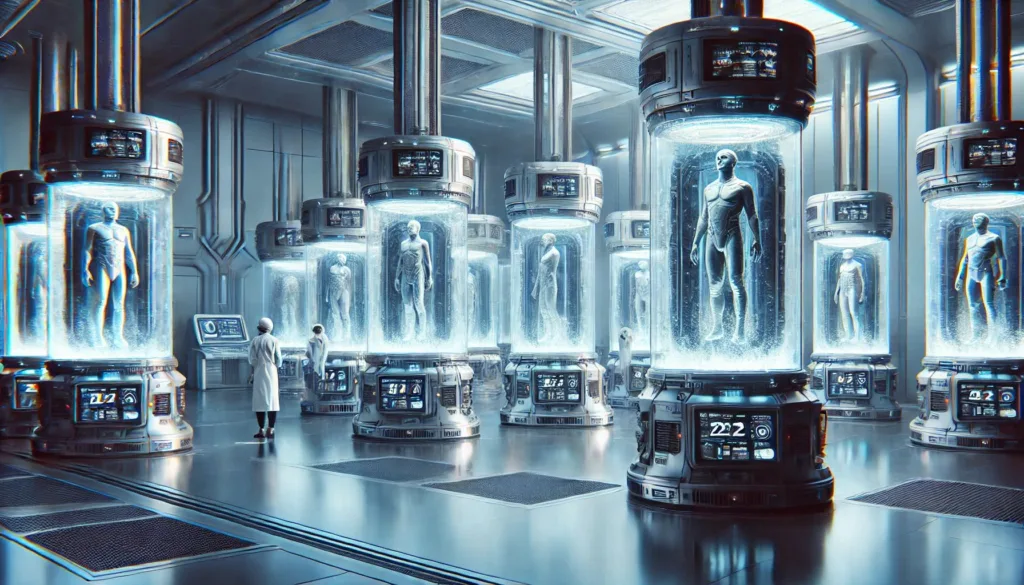Cryonics: A Ticket to Immortality or a Futuristic Gamble?

Would You Freeze Yourself for a Chance at Immortality?
What if you didn’t have to die? What if, instead of accepting the end, you could press pause on life and wake up in a future where science had figured out how to bring people back?
Sounds like a plot straight out of a sci-fi movie, right? Well, a German startup called Tomorrow Bio is working to make it a reality—if you’re willing to bet on the future. For $200,000, they’ll freeze your entire body after you die, storing it at ultra-low temperatures in the hope that future medical advancements will be able to revive you. If you’re looking for a cheaper option, they’ll preserve just your brain for $80,000.
But is this the future of life extension, or just an expensive gamble? Let’s take a closer look.

How Does Cryonics Work?
Cryonics isn’t a new concept—it’s been around since the 1960s. But Tomorrow Bio is taking things to the next level, refining the process to make it more precise and accessible. Here’s how it works:
Step 1: The Moment You Die
Once you’re legally declared dead, time is of the essence. Tomorrow Bio has emergency response teams stationed in Berlin, Amsterdam, and Zurich to act fast. They transport your body to their Swiss facility, where the preservation process begins immediately. The goal? Minimize damage before freezing sets in.
Step 2: Cooling to -198°C
Your body is gradually cooled to -198°C (-324°F). At this temperature, all biological activity—heartbeats, brain function, decay—comes to a complete halt. Scientists call this state biostasis, where you’re neither alive nor decomposing.
Step 3: Long-Term Storage
Once cooled, your body is placed in a liquid nitrogen chamber for long-term storage. You stay there indefinitely, waiting for science to catch up. The hope is that, at some point in the future, advanced medicine, nanotechnology, or AI-driven biological repairs will figure out how to bring you back to life and cure whatever killed you in the first place.

Is Revival Even Possible?
Let’s be clear: no one has ever been brought back from cryopreservation. The idea is based on the hope that future technology—which doesn’t exist yet—will eventually make it possible.
Fernando Azevedo Pinheiro, co-founder of Tomorrow Bio, is optimistic:
“During our lifetime, we may witness the safe cryopreservation and reanimation of complex organisms.”
So far, the company has already frozen six people and five pets, with over 650 clients signed up to be cryopreserved after death.
But here’s the catch: no one knows if this will actually work.
The Big Debate: Science or Fantasy?
Cryonics is one of the most controversial ideas in science today. Some see it as a bold step toward the future, while others think it’s a waste of money and false hope.
The Scientific Challenges
- Freezing Damage – When water inside cells freezes, it expands and can destroy tissues and organs. Even with vitrification (a method to prevent ice formation), we don’t know if the body could be revived intact.
- Memory & Consciousness – Let’s say the body can be revived—will your brain still work? Will you still be you? Scientists have no answers.
- Technology Uncertainty – Cryonics depends on future discoveries that haven’t been made yet. What if they never happen?
The Ethical Questions
- Who Revives You? – Let’s say you wake up 100 or 200 years from now. Who is responsible for you? Will future societies accept people from the past coming back to life?
- Playing God – Should humans interfere with death like this? Some argue that dying is a natural part of life and that trying to avoid it raises serious ethical questions.
- Is It a Scam? – Critics say cryonics companies are selling false hope, promising something that science may never be able to deliver.
Is Cryonics Just for the Rich?
With a $200,000 price tag, cryonics isn’t exactly affordable. Tomorrow Bio claims their long-term vision is to make the process more accessible to the general public.
Right now, it’s mostly wealthy tech enthusiasts, futurists, and transhumanists who are signing up. Companies like Alcor (USA) and KrioRus (Russia) have also been offering cryopreservation for years. But so far, no company has ever revived a human—or even come close.

Would You Freeze Yourself?
This idea isn’t just about defying death—it’s about betting on the future. People who sign up for cryonics believe that science and technology will eventually solve the problem of mortality.
The question is: Would you take the risk?
Whatever your thoughts, one thing is certain: as technology advances, our understanding of life, death, and the possibilities of the future will continue to evolve.
- Would you pay to have your body frozen in the hope that future generations will figure out how to bring you back?
- Or do you think cryonics is nothing more than a futuristic pipe dream?
Would you take the leap into cryonics? Let us know in the comments!






